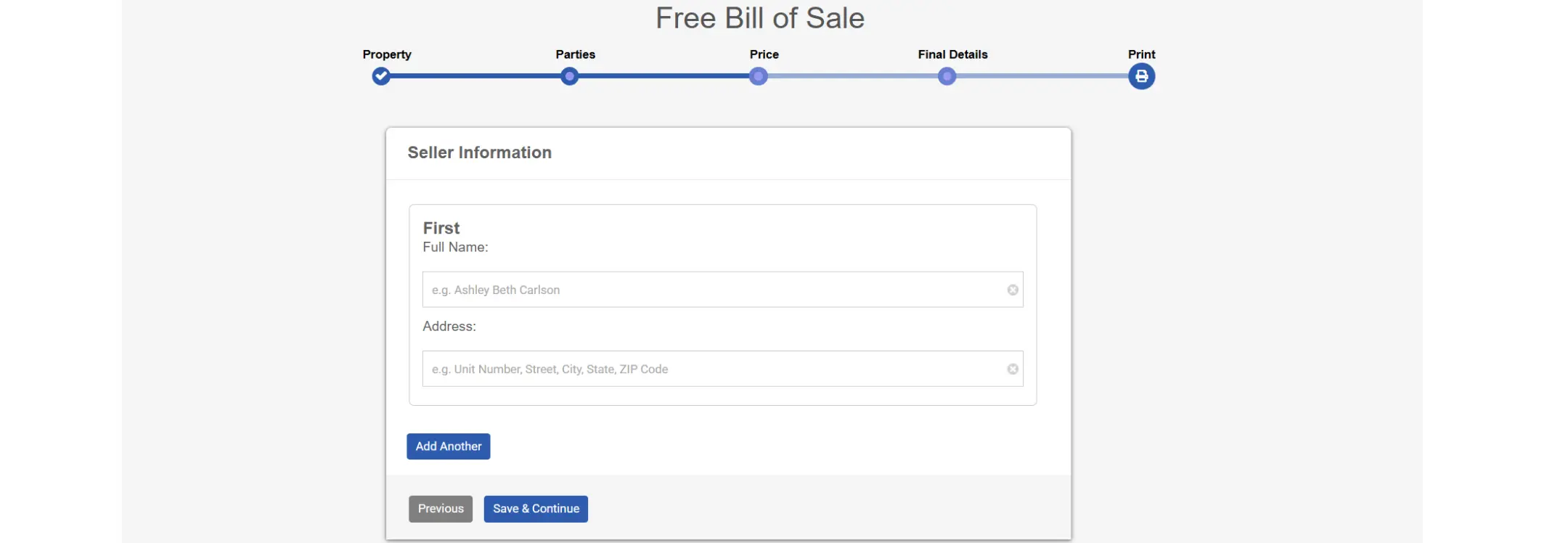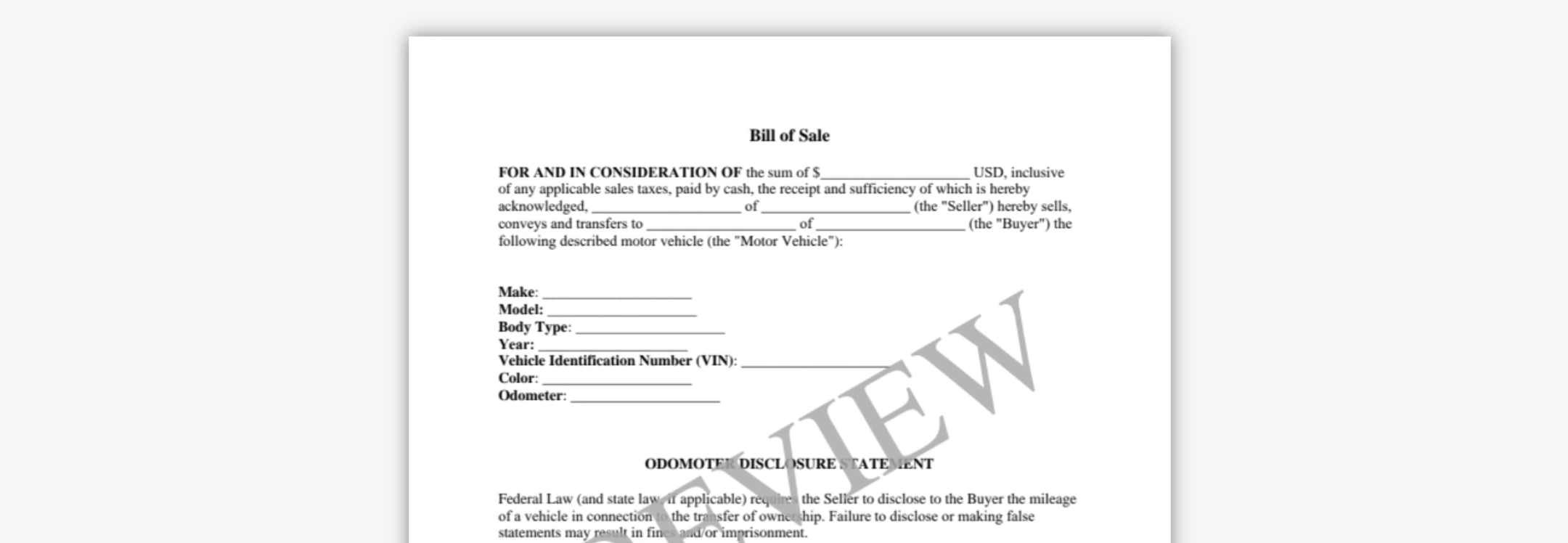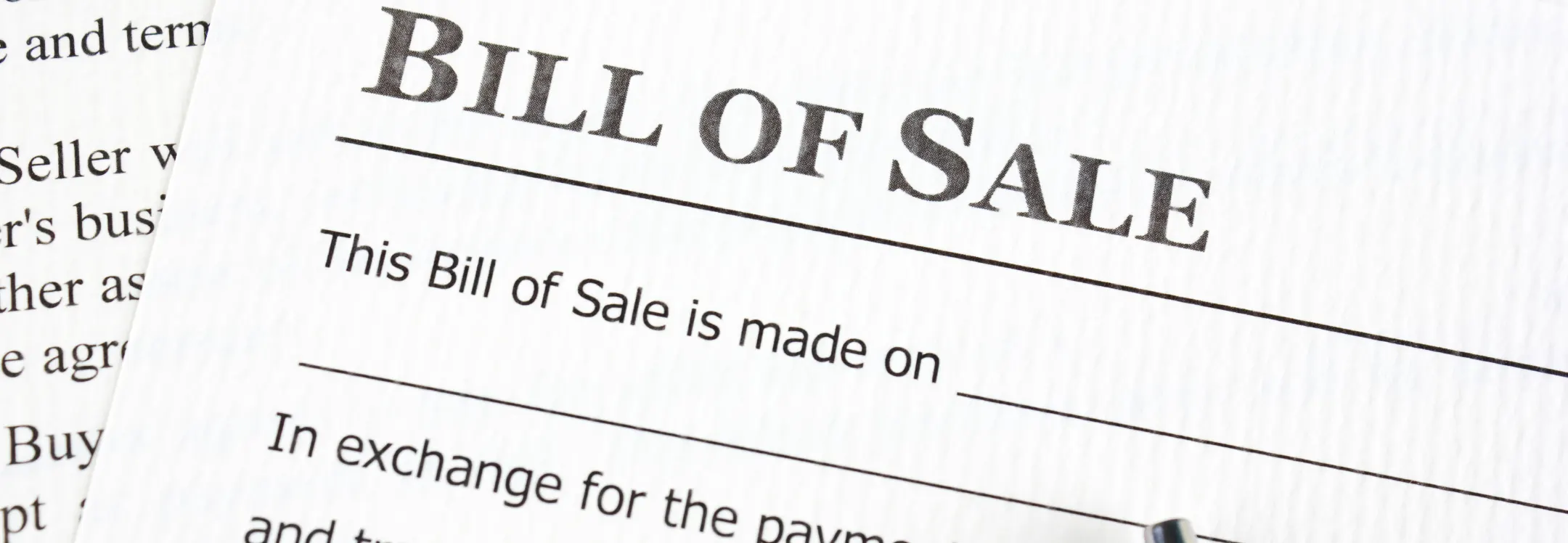TL;DR- A bill of sale legally documents ownership transfer between buyer and seller, requiring accurate party information and detailed item descriptions
- Essential elements include purchase price, payment terms, transfer date, and clear warranties or "as-is" clauses to prevent future disputes
- Proper signatures from both parties are mandatory, with notarization recommended for added legal protection and required in some states
- Vehicle bill of sale documents require specific elements like VIN numbers, odometer disclosures, and compliance with federal and state regulations
- Professional platforms like Ziji Legal Forms ensure all critical elements are included with state-compliant bill of sale templates
Introduction
A bill of sale serves as legal proof of ownership transfer from seller to buyer, creating a documented record that protects both parties in any transaction involving personal property. Whether you're selling a car, boat, trailer, or other valuable items, this document establishes the essential facts of your transaction while providing legal protection against future disputes or claims.
An incomplete or poorly drafted bill of sale form can lead to serious complications, including invalidation of the transfer, disputes over payment terms, or liability issues that persist long after the transaction is complete. Courts regularly see cases where inadequate documentation creates expensive legal battles between parties who thought they had clear agreements.
Understanding the key elements that every bill of sale template must include ensures your document provides proper legal protection while meeting all state and federal requirements. This comprehensive guide examines each critical component that makes a bill of sale legally valid and enforceable.
Parties to the Sale
The foundation of any effective car bill of sale or general bill of sale begins with accurate identification of all parties involved in the transaction. This section establishes who is transferring ownership and who is receiving it, creating clear legal accountability for both sides of the agreement.
Complete Legal Information Required
Full legal names must appear exactly as they appear on government-issued identification documents. Using nicknames, abbreviated names, or informal variations can create problems during title transfers or if legal disputes arise later. Include middle names or initials when they appear on official identification to ensure complete accuracy.
Contact information for both buyer and seller should include current addresses, phone numbers, and email addresses when available. This information proves essential if questions arise about the transaction or if one party needs to contact the other regarding warranty issues, recalls, or legal requirements.
Business entity details require additional care when either party represents a company, corporation, or other legal entity. Include the complete registered business name, tax identification numbers when appropriate, and the name and title of the person authorized to sign on behalf of the organization.
Detailed Description of the Item
Accurate item description prevents misunderstandings and protects against fraud claims by establishing exactly what is being transferred. This section requires specific details that uniquely identify the property being sold.
Vehicle-Specific Requirements
Vehicle identification information must include the complete Vehicle Identification Number, make, model, year, body style, color, and current odometer reading. The VIN serves as the primary identifier that distinguishes your specific vehicle from others with similar characteristics.
Condition documentation should note any significant damage, mechanical issues, or modifications that affect the vehicle's value or operation. While detailed condition reports aren't always required, noting major issues provides protection against claims of misrepresentation. To know more about vehicle specific requirements, read our blog on Car Bill of Sale Templates: How To Use and Customize Them
General Property Descriptions
Serial numbers and unique identifiers help establish the specific item being transferred when available. For electronics, appliances, or equipment, include model numbers, serial numbers, and manufacturer information that clearly identifies the exact item.
Physical characteristics such as size, color, age, or distinguishing features help prevent confusion when similar items exist. Detailed descriptions become especially important for handmade items, antiques, or custom property without standard identification numbers.
Sale Price and Payment Terms
Clear financial terms prevent disputes about payment amounts, methods, or schedules while establishing the transaction's monetary value for tax and legal purposes.
Purchase Price Documentation
Written and numerical amounts should state the purchase price in both formats to prevent confusion or alteration. For example, write "$5,000 (Five Thousand Dollars)" to ensure clarity about the agreed-upon amount.
Currency specification becomes important for international transactions or when accepting alternative payment methods. Specify whether payment is in U.S. dollars, foreign currency, or other valuable consideration like trade goods and services or even bitcoin.
Payment Method Details
Accepted payment forms should clearly state whether payment will be made by cash, certified check, bank transfer, or other approved methods. This specification protects both parties by establishing exactly how the financial transaction will occur.
Installment arrangements require detailed schedules when buyers will pay over time. Include payment amounts, due dates, interest rates if applicable, and consequences for late or missed payments. Complex payment arrangements may require additional documentation beyond the basic bill of sale.
Date of Sale and Transfer of Ownership
The transfer date establishes exactly when ownership legally changes hands, affecting liability, insurance requirements, and tax obligations for both parties.
Legal Transfer Moment
Precise timing should specify not just the date but the time when ownership transfers if relevant to your situation. For vehicles, this timing affects liability for accidents, traffic violations, or other incidents that occur after the sale.
Conditional transfers may require different handling when ownership depends on completing specific requirements like inspections, financing approval, or delivery arrangements. Document any conditions that must be met before ownership actually transfers.
Registration and Title Implications
DMV notification requirements vary by state but generally require prompt notification of ownership changes. The transfer date established in your bill of sale pdf becomes the official record used by government agencies to track ownership changes.
Insurance considerations depend on the transfer date for determining when coverage responsibilities shift from seller to buyer. Clear documentation prevents gaps in coverage that could leave either party financially exposed.
Warranties or "As-Is" Clause
This section defines what guarantees, if any, the seller provides about the item's condition, legal status, or performance capabilities.
Warranty Provisions
Specific guarantees might include promises about the item's working condition, remaining useful life, or freedom from known defects. Written warranties create legal obligations for sellers and provide buyer protections beyond basic ownership transfer.
Limited warranty terms define exactly what is guaranteed, for how long, and what remedies are available if problems arise. Even simple warranties should specify their scope and duration to prevent misunderstandings about the seller's ongoing obligations.
"As-Is" Sales Protection
No warranty disclaimers protect sellers from future claims about the item's condition or performance. The "as-is" clause establishes that buyers accept all risks associated with the purchase and cannot seek compensation for problems discovered later.
Legal disclaimer language should be conspicuous and clearly written to ensure enforceability. Many states require warranty disclaimers to appear in bold print or capital letters to ensure buyers understand they are accepting all risks associated with the purchase.
Signatures of Both Parties
Valid signatures from all parties create the legal commitment necessary to enforce the bill of sale terms and establish binding agreement to the transaction.
Signature Requirements
Original signatures provide the strongest legal protection, though electronic signatures may be acceptable under certain circumstances and state laws. Both buyer and seller must sign the document to create mutual agreement and legal enforceability.
Printed names and dates should accompany signatures to ensure clear identification of who signed and when. This information becomes crucial if questions arise about the document's authenticity or timing of the agreement.
Witness and Additional Protections
Witness signatures may be required in some states or recommended for high-value transactions. Witnesses provide additional verification that parties signed voluntarily and understood the transaction terms.
Corporate authorization requires additional documentation when business entities are involved. Include titles of signing parties and verification that they have authority to bind their organizations to the agreement terms.
Notarization: Optional but Recommended
While not always legally required, notarization adds significant credibility and legal protection to bill of sale documents.
Benefits of Notarization
Identity verification through notarization provides strong evidence that the people who signed are actually the parties identified in the document. This protection helps prevent fraud and ensures enforceability if disputes arise.
Voluntary signature confirmation establishes that parties signed willingly without coercion or duress. Notaries verify that signers understand the document's contents and implications before adding their official seal.
When Notarization Is Required
State-specific mandates require notarized automobile bill of sale documents in certain jurisdictions, particularly for vehicle transfers. Check local requirements to ensure compliance with applicable laws.
High-value transactions often benefit from notarization even when not required, as the additional legal protection justifies the modest cost and time involved.
State-Specific Requirements
Beyond basic bill of sale elements, many states impose additional requirements that must be included for legal validity and regulatory compliance.
Federal Vehicle Requirements
Odometer disclosure statements are federally mandated for most vehicle transfers to prevent fraud and provide accurate mileage information. These disclosures require specific language and must be completed by both buyer and seller. Lien holder information must be documented when vehicles have existing loans or security interests. The bill of sale should clearly identify any financial institutions with claims against the vehicle being transferred.
Additional State Requirements
Emissions and inspection status may need documentation in states with environmental or safety inspection requirements. Some jurisdictions require disclosure of inspection status or emissions compliance as part of the transfer process. Tax implications vary significantly between states, with some requiring specific tax calculations or payment arrangements to be documented in the bill of sale. Understanding local tax requirements prevents problems during registration or title transfer. Because even small drafting errors can create serious legal complications.
Creating a Bill of Sale with Ziji Legal Forms
Professional platforms like Ziji Legal Forms simplify bill of sale creation by providing comprehensive templates that automatically include all critical elements while ensuring state-specific compliance.
1. Go to the Ziji Legal Forms website and find the Bill of Sale form
Navigate to Ziji Legal Forms’ homepage and click on “Financial” category on the top and then click on "Bill of Sale". There you will usually see a description of the form and a button that says “Create Document.”
2. Start the document interview process
Click the “Create Document” button. The platform will launch a questionnaire that gathers all the necessary information for your bill of sale.
3. Enter the details of your sale
The online form will prompt you to fill in various fields we covered above including the "Parties to the Sale", "Detailed Description of the Item", "Sale Price and Payment Terms", "Date of Sale and Transfer of Ownership", "Warranties or "As-Is" Clause", and "Signature of Both Parties"
4. Review your completed Bill of Sale
After you’ve answered all the prompts, the platform will create a preview of your fully formatted Bill of Sale document. Review all the information and make sure names are spelled correctly, addresses are right, the item description is accurate, and the price is correct. In case anything needs changing, you can simply go back in the questionnaire or edit the fields before finalizing. Ziji Legal Forms allows you to revise your answers as many times as needed before downloading, so you can tweak any detail.
Advantages of using Ziji Legal Forms Templates
Legally valid documents created through professional platforms incorporate current legal requirements and standard language that courts recognize and enforce. This professional preparation eliminates guesswork about necessary elements or proper formatting. State-specific customization ensures your free bill of sale template includes all local requirements without requiring extensive research into varying state laws and regulations. The platform automatically incorporates necessary disclosures and language based on your location.
User-Friendly Process
Easy customization allows users to input specific transaction details while maintaining legal compliance and professional formatting. The guided process ensures no critical elements are overlooked while accommodating unique transaction circumstances. Peace of mind comes from using professionally designed documents that have been tested in various legal situations. This reliability protects both parties while providing confidence that the document will be accepted by courts, DMV offices, and other relevant authorities.
Conclusion
Creating a legally valid bill of sale requires careful attention to essential elements that protect both buyer and seller while ensuring regulatory compliance. From accurate party identification to proper warranty disclaimers, each component plays a crucial role in preventing disputes and establishing clear legal rights.
Professional platforms like Ziji Legal Forms eliminate the complexity and risk associated with creating these important documents from scratch. By providing comprehensive bill of sale templates that automatically include all necessary elements, these tools ensure your transaction documentation meets legal standards while saving time and reducing errors.
Whether you need a simple bill of sale for basic transactions or complex documentation for high-value transfers, investing in proper preparation protects your interests and provides peace of mind. The modest effort required to create complete, accurate documentation pays dividends through smoother transactions and reduced legal risks for all parties involved.
Bill of Sale FAQs
What is a bill of sale also known as?
A bill of sale is also known as the following: sales receipt, or proof of purchase. It can also have a longer name that references the item being sold, for example: RV trailer bill of sale, or bill of sale for vehicle.
What is a bill of sale?
A bill of sale is a document that serves as the proof of purchase and the transfer of ownership between the buyer and the seller.
When should you use a bill of sale?
The most common property sold with a bill of sale is the private sale of a vehicle, but a bill of sale can be used with virtually all physical goods that are sold privately. However, land and real estate cannot be sold with a bill of sale and a warranty deed should be used instead.
Here are some examples of goods that you could sell by customizing our bill of sale template:
- Motor vehicles: cars, trucks, and motorcycles
- Recreational vehicles: campers, trailers, RVs, mountain bikes, dirt bikes, golf carts, and snowmobiles
- Watercrafts: boats, motorboats, sail boats, jet skis, and canoes
- Firearms: hand guns, and rifles
- Electronics: cell phones, laptops, tablets, computers, and TVs
- Goods: clothing, jewellery, and watches
- Equipments: lawnmowers, tractors, and home appliances
- Animals: pets such as cats and dogs, and farm animals like horses and cattle
What should a bill of sale cover?
The bill of sale should have the 3 Ps: parties, property, and price.
- Parties: list the buyer and seller and their respective addresses.
- Property: list the property in detail so it is identifiable. For example in the sale of a used vehicle, list the make, model, year, vehicle type, VIN number, and odometer reading for the car. For electronics, list the product model and serial number/ID number. Be specific and describe in detail what product is sold.
- Price: list the cost of the product and whether the sale price has any payable taxes.
- Payment method: list the forms of payment used for purchase such as cash, personal check, credit card, etc.
What does an item being sold “as is” mean?
If an item is sold “as is” it means the seller does not guarantee the condition of the item. Basically it means the buyer will be accepting the item in its current condition and the seller will not be responsible for any flaws or defects.
Who should sign the bill of sale?
Typically for more expensive items like vehicles and boats both the buyer and seller should sign the bill of sale. It’s a good practice to get both parties to sign regardless because it adds a layer of authenticity to the intention of both parties to transfer the property’s ownership.
Do I need to get my bill of sale notarized?
Most states do not require the notarization of a bill of sale. However, there are six states that require the bill of sale be notarized before it can be used to transfer the ownership of a vehicle. States that require a notary for a vehicle’s bill of sale are: Louisiana, Maryland, Montana, Nebraska, New Hampshire, and West Virginia. For states that do not require a notary to sign the bill of sale, you should still always have both the buyer and the seller sign the document.
Despite that notarization is not required in most cases, you may still want to have the bill of sale notarized for more expensive goods such as boats and RVs, since the notarization will serve as an extra layer of authentication of the transaction in case there is any future dispute in court.
Can a bill of sale be used for both new and used items?
Yes, a bill of sale can document the sale of both new and used items. It provides proof of the transaction and ownership transfer regardless of the item’s condition or age.
What information should I keep after the bill of sale is signed?
Both buyer and seller should keep a copy of the signed bill of sale for their records. This can be useful for tax purposes, warranty claims, or resolving any future disputes related to the sale.
Is a bill of sale the same as a receipt?
While similar, a bill of sale is more detailed than a basic receipt. It not only shows proof of payment but also includes information about the transfer of ownership, making it a more comprehensive legal document.
Can I use a bill of sale for selling items online?
Yes, a bill of sale is useful for documenting sales made online, especially for valuable items. It helps formalize the transaction and protects both buyer and seller by outlining the terms of sale.
What should I do if the buyer wants a warranty or guarantee?
If a warranty or guarantee is involved, this should be clearly stated in the bill of sale. Otherwise, most private sales are “as is,” meaning the seller makes no promises about the condition or future performance of the item.
What jurisdictions can use our bill of sale?
You can use our template to create a legal and valid bill of sale for the following jurisdictions:
|
Alabama
Alaska
Arizona
Arkansas
California
Colorado
Connecticut
Delaware
District of Columbia
Florida
Georgia
Hawaii
Idaho
Illinois
Indiana
Iowa
Kansas
Kentucky
Louisiana
Maine
Maryland
Massachusetts
Michigan
Minnesota
Mississippi
Missouri
Montana
Nebraska
Nevada
New Hampshire
New Jersey
New Mexico
New York
North Carolina
North Dakota
Ohio
Oklahoma
Oregon
Pennsylvania
Rhode Island
South Carolina
South Dakota
Tennessee
Texas
Utah
Vermont
Virginia
Washington
West Virginia
Wisconsin
Wyoming |
AL
AK
AZ
AR
CA
CO
CT
DE
DC
FL
GA
HI
ID
IL
IN
IA
KS
KY
LA
ME
MD
MA
MI
MN
MS
MO
MT
NE
NV
NH
NJ
NM
NY
NC
ND
OH
OK
OR
PA
RI
SC
SD
TN
TX
UT
VT
VA
WA
WV
WI
WY |




